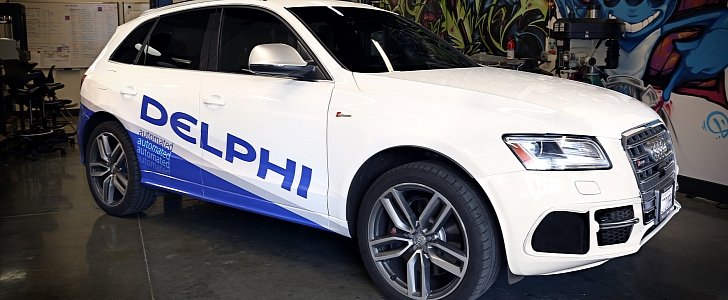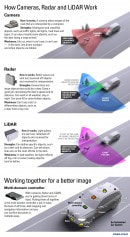Delphi, one of the world’s leading automotive suppliers, will operate a ride-hailing service in Singapore using self-driving cars.
The company has signed a deal to form a consortium, which will handle the self-driving vehicle trial set to begin next year in Singapore. The idea behind this deal is to put the company’s self-driving technology to the test in one of the world’s most busiest cities, and with real traffic conditions and needs.
For the trial to work flawlessly, the vehicles will have humans behind the wheel at all times, ready to step in and avoid a potentially dangerous situation. Eventually, as the trial moves towards the end of its two-and-a-half-year contract with the city, the human drivers will step down from the vehicles altogether.
Delphi wants to demonstrate it has a robust and reliable technology, which is fully compatible with user demands and other requirements. Even though Delphi does not want to bring autonomous vehicles to market in the form presented in Singapore, the supplier will demonstrate to its partners that it can develop and provide tech for driverless vehicles.
These technologies could be integrated into production vehicles for crash-avoidance purposes, as well as semi-autonomous driving features. Delphi has chosen Singapore for this trial because it already has a factory and a Research&Development center there, and the city’s streets are crowded and have busy traffic.
As Automotive News reports, Delphi will be involved with six other partners, and it will operate a fleet of six vehicles. The partners will be named at a later date, but Delphi is the leading company of the consortium. Delphi showcased a self-driving Audi SQ5 (as seen in the photo gallery) last year, but the same model will not be used for the autonomous ride-hailing service.
In the case of the Singapore self-driving fleet, Delphi will retrofit each vehicle with cameras, radar, and LIDAR. Customers will request a ride using an app, and the cars will pick them up and drive them to the selected destination. Each client can choose to stop the fare and get off earlier, if desired.
Once the human drivers step down from the wheel, Delphi will program each self-driving vehicle it operates to slow down, pull over, and stop if it discovers a malfunction in its autonomous drive system. The same procedure happens in Google’s self-driving prototypes in the case of a failure.
For the trial to work flawlessly, the vehicles will have humans behind the wheel at all times, ready to step in and avoid a potentially dangerous situation. Eventually, as the trial moves towards the end of its two-and-a-half-year contract with the city, the human drivers will step down from the vehicles altogether.
Delphi wants to demonstrate it has a robust and reliable technology, which is fully compatible with user demands and other requirements. Even though Delphi does not want to bring autonomous vehicles to market in the form presented in Singapore, the supplier will demonstrate to its partners that it can develop and provide tech for driverless vehicles.
These technologies could be integrated into production vehicles for crash-avoidance purposes, as well as semi-autonomous driving features. Delphi has chosen Singapore for this trial because it already has a factory and a Research&Development center there, and the city’s streets are crowded and have busy traffic.
As Automotive News reports, Delphi will be involved with six other partners, and it will operate a fleet of six vehicles. The partners will be named at a later date, but Delphi is the leading company of the consortium. Delphi showcased a self-driving Audi SQ5 (as seen in the photo gallery) last year, but the same model will not be used for the autonomous ride-hailing service.
In the case of the Singapore self-driving fleet, Delphi will retrofit each vehicle with cameras, radar, and LIDAR. Customers will request a ride using an app, and the cars will pick them up and drive them to the selected destination. Each client can choose to stop the fare and get off earlier, if desired.
Once the human drivers step down from the wheel, Delphi will program each self-driving vehicle it operates to slow down, pull over, and stop if it discovers a malfunction in its autonomous drive system. The same procedure happens in Google’s self-driving prototypes in the case of a failure.





